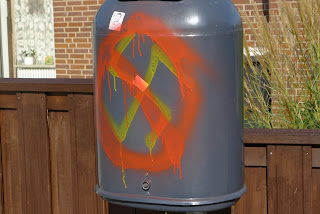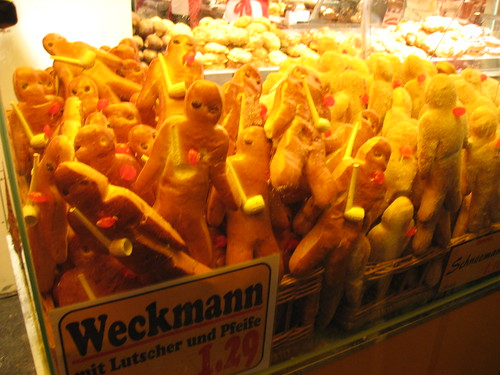If you haven't guessed it already, the subject for today is Nazism. World War II ended in 1945, but the subject of Nazism and Fascism is still quite prevalent today.
To get started, I'd like to point out the worst thing you could possibly say when talking to a German to the first time. I don't know if the people who say these things believe they're actually funny, or if they just don't have a clue, but I've heard the same story from multiple Germans. That is, upon arriving in the US, they were told things like "Heil Hitler!" or "How are you treating your Jews these days?" or even "How's Hitler doing?" (someone in the world believes that Hitler is still alive... I didn't ask.) This is possibly the most utterly rude thing I could imagine saying, and leads to a downright awful first impression -- both with the speaker themself and the country at large. There's nothing like being greeted with ignorant slurs to sour foreign relations.
Here's the problem: even saying the word 'Nazi' is taboo in Germany. Most every German thinks of WWII as a terrible dark spot in their country's past, and will often intentionally avoid the subject if it can be helped. Imagine, as an American, that you were attacked by a foreigner about certain low points in our own past -- the treatment of the American Indians early in our history, slavery, racial segregation, and so on. Even though you had nothing to do with these atrocities, you might still feel a wave of guilt or anxiety at the thought. This is how Germans feel, which is made a lot harder by the fact that many non-Germans treat the matter flippantly, or even make jokes about it.
Now of course, this is not to say that no Nazism or Neo-Fascism exists in Germany. Although the country has, for the most part, left the sins of WWII behind them, there are still those who choose to believe in the teachings of Hitler. This is true around the world (we have our own share of Neo-Nazis and Holocaust deniers in the US,) but it does seem quite prevalent here in Germany.
One of the most common themes in graffiti (and there is quite a lot of graffiti in this area) is swastikas. They're spray painted on buildings, stuck to signs, and drawn in sharpie on the desks in school. However, I have never seen a swastika that has not been crossed out by a second graffiti artist. For every one Neo-Nazi there is a horde of angry Germans ready to shut them down. In addition to the removal of pro-Nazi street art, there are stickers that read "Gegen Nazis" ('Against Nazis') that have been spread and stuck in just as many places as the swastikas.
There is much, much more to say on the subject (I don't know much about it, but I could still go on for hours,) but I think I'll leave it at that for the day. I might possibly add another post on the subject in the future, as it is quite prevalent and deserves to be discussed.
There is much, much more to say on the subject (I don't know much about it, but I could still go on for hours,) but I think I'll leave it at that for the day. I might possibly add another post on the subject in the future, as it is quite prevalent and deserves to be discussed.
---For further reading---
"In Germany immediately after World War II, Allied forces and the new German government attempted to prevent the creation of new Nazi movements through a process known as denazification. The West German government had passed strict laws prohibiting Nazis from publicly expressing their beliefs as well as barring them from the political process. Displaying the swastika was an offense punishable by up to one year imprisonment. There was little overt neo-Nazi activity in Europe until the 1960s. However, some former Nazis retained their political beliefs, and passed them down to new generations.
After German reunification in the 1990s, neo-Nazi groups gained more followers, mostly among disaffected teenagers in the former East Germany. These gangs were formed under their dislike of the communist system installed after WWII, then the system collapsed in 1989. Many of the groups that increased their membership this way were new, having arisen amidst the economic collapse and high unemployment in the former East Germany. They have also had an aversion to people from Slavic countries (especially Poland) and people of other national backgrounds who moved from the former West Germany into the former German Democratic Republicafter Germany was reunited. Much of their ideology was similar to Strasserism.
According to the preliminary version of the annual report of Germany's interior intelligence service (Verfassungsschutz) for 2010,[61] there are currently 25,000 right-wing extremists living in Germany,[62] including 5,600 neo-Nazis.[63] Neo-Nazi organizations, related and derivative symbols and Holocaust denial are outlawed in Germany according to the German Criminal Code (Strafgesetzbuch § 86a) and § 130 (public incitement)."
-- From the Wikipedia article on Neo-Nazism
-- and also This Article on Denazification
((I found this second article quite interesting, and found a lot of new information on post-WWII Germany))
On the window of a local bar
On a street sign near my home
On a trashcan on the way to my school










